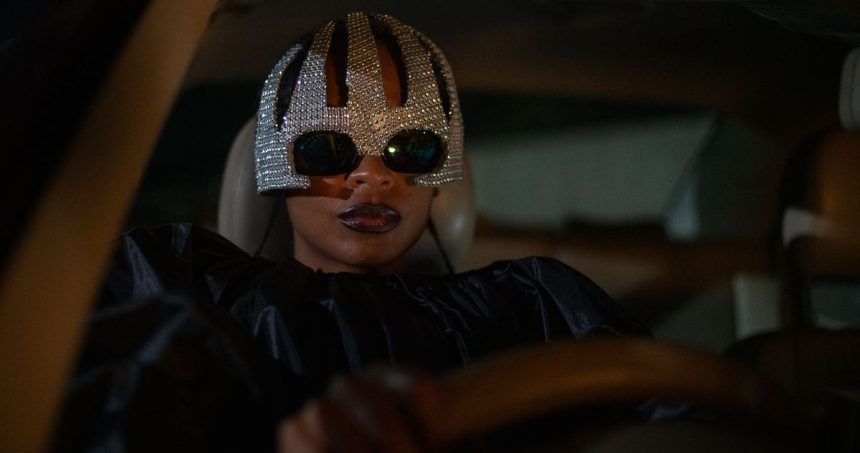The Cannes prizewinner will soon be released in the U.S. by A24. Its off-kilter, absurdist vibe is enchanting, but it’s rooted in deep horror.
Photo: Chibesa Mulumba/A24
Rungano Nyoni’s lovely On Becoming a Guinea Fowl won a Best Director prize in the Un Certain Regard section of Cannes this year. A24 will be releasing the film in the U.S, and it feels like a movie that will get people talking once it can be seen broadly. I suspect the blend of absurdist humor with horrific undercurrents will resonate.
“Dad, it’s Shula. I’ve found Uncle Fred’s body on Kulu Road,” our protagonist (played by Susan Chardy) offers without any inflection or expression at the start of the film. She’s all dressed up for a costume party, decked out in Missy Elliot’s diamond-studded sunglass mask and poofy black outfit from “The Rain” video, and her appearance, combined with her deadpan demeanor, establishes the surreal mood of the film. Speaking on the phone with her father, she shows no shock about the fact that she’s just come across her uncle’s lifeless body on a lonesome road in the middle of the night. The father, for his part, sounds more interested in asking for money from his daughter, who we learn has just briefly returned to Zambia from living in Europe. So we might not make much of the fact that, as Shula walks away from Uncle Fred’s body, she briefly sees herself, maskless, still looking at his corpse. And when her drunk, animated cousin Nsansa (Elizabeth Chiseal) suddenly appears out of the night, dancing and laughing and yelling and doing all the things that the supernaturally restrained Shula doesn’t do, we might accept it all as further evidence of the weird parabolic world of the movie.
We wouldn’t be wrong, exactly, but director Nyoni has other plans in store for us. Over the course of the next few days, Shula will find herself in the midst of a traditional grieving ritual, hierarchical and surreal in its own way. She and Nsansa are asked to cook and serve food to the men of the family, and to stand by while accusations are leveled at Fred’s widow for not grieving properly. They’re forced to rope another cousin, young university student Bupe (Esther Singini), into the proceedings, despite the fact that she appears to be deathly ill, possibly the result of a suicide attempt. Framed by the needs of a traditional funeral, the world appears to have become topsy-turvy. Characters appear mysteriously from one scene to the other. People judge others for the precise pitch of their wails. Every emotion feels like the opposite of what might ordinarily be expected.
As the whole mad ritual continues, we learn more about Shula’s family, and why everyone is acting the way they’re acting. Although On Becoming a Guinea Fowl continues with its bursts of startling imagery and its heady dream-logic, we gradually suspect there are other reasons why this world seems so off-kilter. The comedy transforms into something altogether more horrific, and we realize we’re watching each of these women process unspoken trauma in her own way.
All throughout, Nyoni cuts to clips from an old children’s television program called “Farm Club,” in which a group of kids learn about letters and animals. The host begins to give clues about “a special and unusual animal found in Africa.” It lives to 20 years and can be brown, red, yellow, black or white. The host doesn’t name the animal at first, but we understand, of course, that it’s the guinea fowl. Over the course of the film, we’ll learn about the unique role guinea fowl play in helping keep other animals safe from predators. This may sound like a heavy-handed metaphor, but the precise way it’s handled here renders it surprisingly light-hearted and imaginative.
Lest we assume that it’s just mourning and trauma that turn human interactions on their head, the film takes an interesting turn in its later scenes. Throughout the picture, Shula and other girls are told not to dredge up the past, or do anything that could harm their extended family’s unity and stability. But we eventually see everyone else do exactly that: Those who told them not to ruffle feathers turn around and dig up other resentments, thinking little of family unity or even propriety. This betrayal, too, has the feel of a ritual — a broader social one that feels all too familiar to us. The off-kilter, absurdist vibe of the picture is enchanting, but it’s rooted in deep horror: The whole movie is about the ways that cruelty and injustice become codified. Sometimes, the only way to preserve your sanity is to go a little insane yourself.











